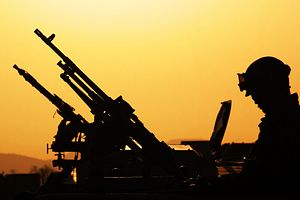Combat operations in Afghanistan will finally be over at the end of 2014, and the last American soldier will leave by the end of 2016. This will not be the first time Afghans will be left to fend for themselves.
Despite being the longest war in its history, the U.S. led war in Afghanistan could neither stabilize the country or the South Asian region in general. Undue expectations, harsh terrain, and unruly neighbors are the main reasons the U.S. and its coalition partners could not achieve their objectives. With other security hot spots opening up in the Middle East and the Horn of Africa, Afghanistan now looks destined to take a back seat. The U.S. gains in Afghanistan (dismantling al-Qaeda , training Afghan forces, female education and establishing a democratic process) look modest, especially when viewed in terms of both human and capital losses.
War Mismanagement
Lack of coordination among U.S. and coalition agencies was the norm rather than the exception. Even a tiny forward operating base would typically have representatives from many U.S. agencies, such as the State Department, USAID, the Department of Agriculture, and Provincial Reconstruction Teams. Some of them inadvertently worked against the mission and undermined the local battlespace owner.
The mission in Afghanistan was never clearly defined by the White House or the Pentagon. Ground commanders had little understanding of their stated goals, and they were unsure how to achieve their objectives. With changes in leadership, the mission switched between enemy combat, counterinsurgency, counterterrorism, and nation building. And until recently, there was no exit strategy.
Prosecution of the war was hamstrung by a lack of knowledge of the local language, religion and culture. The infamous Quran-burning incident at one of the U.S. bases was a direct result of this ignorance. Marines typically served for nine months and Army soldiers for ten months, and every time they rotated, operational continuity was broken.
Just like Russia in 1980s, the U.S. also depended heavily on the concept of “security bubbles” to fight the war. The security perimeter was concentrated on population centers (a population–centric counterinsurgency) and U.S. commanders paid local Afghan commanders to buy their protection and loyalty. The periphery was left to the Taliban, who operated freely and attacked coalition forces from the outside.
Substandard linguists were hired, unable to facilitate communication between the two sides. The linguists themselves were reportedly involved in corruption and embezzlement, and in some cases intentionally misled the teams they were assigned to.
Imposing a Foreign System
Afghans have traditionally preferred to live in a tribal society, repulsing foreign invaders and influences. With their own tribal policing, disputes were resolved in a traditional setting. For centuries, Afghans have had a parallel system of conflict resolution called the “Jirga,” and people have turned to this tradition instead of bringing their disputes to the government or courts.
When the U.S. decided to try its hand at “nation building” in Afghanistan, it chose to revamp the government and installed district governments and a top-heavy bureaucracy. Afghanistan has now had two successful democratic elections, but that is where the similarity with Western democracy ends.
Most districts were given up to 35 officials, including two prosecutors, a “Huquq” judge (to resolve civil disputes) and a district judge. In most instances, they could not attract any cases and were simply paid with U.S. taxpayers’ money. Afghans are traditionally used to a minimal government presence, and the current massive bureaucracy is neither desirable or sustainable by the cash-stripped Afghan government.
Unsustainable Economics
Billions of dollars are being spent on development projects every year, but some of the funds were diverted to Taliban commanders. One senior U.S. Marine commander termed it a “fake economy.” Every convoy paid a specified sum of money to the local Taliban commanders to pass safely under their areas of control. It was virtually impossible for any Afghan contractor to operate without the consent of the local Taliban insurgents.
A portion of Taliban funding came from drug networks. There was never a concerted effort to eradicate poppy production on the part of the U.S. led coalition. Consequently, poppy cultivation has doubled in the last couple of years.
White elephant projects were initiated by the U.S. and other coalition partners. There are hundreds of ghost schools and hospitals.
The U.S. involvement has created a culture of entitlement, and a welfare state in Afghanistan. It is ironic that those who vehemently oppose a welfare state in the U.S. are in favor of running one in Afghanistan. The U.S. military has been using money to achieve its objectives in Afghanistan since the war began in 2001. Money As A Weapon System – Afghanistan (MAAWS-A) is official policy, and commanders are allocated emergency response funds.
Unruly Neighbors
How to deal with Afghanistan’s neighbors was a major dilemma for U.S. officials and ground commanders in Afghanistan. An effective strategy was never evolved to deal with the Pakistan problem, or to seal off the infiltration of Taliban commanders and recruits from across the Durand Line. Nor was their a strategy to deal with the Afghan Taliban operating from Quetta (the so-called Quetta Shura).
The net result of all these scattered, unfocused, but sincere efforts is a quasi-stable Afghanistan much dependent on its immediate neighbors. Afghanistan is faced with major challenges, from security, to corruption, to terrorism and, most of all, a lack of national identity. Even the U.S. itself has greatly tempered its optimism, with President Barak Obama conceding “Afghanistan will not be a perfect place, and it is not America’s responsibility to make it one.”
Much is at stake in the next chapter of Afghan history. If the country is to have a chance, then the warring factions, both internal and external, must pull back from their positions and let ordinary Afghans decide their fate.
Asim Yousafzai, Ph.D. is a geo-political analyst at the University of Maryland and can be followed @asimusafzai on Twitter

































